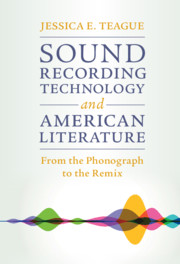Book contents
- Sound Recording Technology and American Literature
- Cambridge studies in American Literature and Culture
- Sound Recording Technology and American Literature
- Copyright page
- Dedication
- Contents
- Figures
- Acknowledgments
- Introduction Resonant Reading
- Chapter 1 Ears Taut to Hear
- Chapter 2 Ethnographic Transcription and the Jazz Auto/Biography
- Chapter 3 Press Play
- Chapter 4 The Stereophonic Poetics ofLangston Hughes and Amiri Baraka
- Chapter 5 From Cut-up to Mashup
- A Post-Electric Postscript Recording and Remix Onstage
- Notes
- Works Cited
- Index
- Recent Books In This Series (continued from page ii)
Chapter 1 - Ears Taut to Hear
John Dos Passos Records America
Published online by Cambridge University Press: 07 May 2021
- Sound Recording Technology and American Literature
- Cambridge studies in American Literature and Culture
- Sound Recording Technology and American Literature
- Copyright page
- Dedication
- Contents
- Figures
- Acknowledgments
- Introduction Resonant Reading
- Chapter 1 Ears Taut to Hear
- Chapter 2 Ethnographic Transcription and the Jazz Auto/Biography
- Chapter 3 Press Play
- Chapter 4 The Stereophonic Poetics ofLangston Hughes and Amiri Baraka
- Chapter 5 From Cut-up to Mashup
- A Post-Electric Postscript Recording and Remix Onstage
- Notes
- Works Cited
- Index
- Recent Books In This Series (continued from page ii)
Summary
Perhaps no writer was more attuned to the shape-shifting nature of sound recording technology than John Dos Passos, whose fascination with modern mass media inflected his early writing and shaped the form of his multimodal novel trilogy U.S.A. (1930, 1934, 1936). By the mid-1920s, the phonograph was no longer new and was, in fact, threatened with obsolescence by the emergence of the radio. And yet, at the same moment that radio began to encroach on the consumer market for phonographs, rapid changes were taking place in sound reproduction -- including the introduction of the condenser microphone and electrical recording -- that were reshaping the ways people would hear recorded sound. As I show, Dos Passos’s innovation was to make use of readers’ ears as highly tuned instruments for listening. But now these novels require a recuperative act of resonant reading to resurface the sonic logic of Dos Passos’s noisy prose.
- Type
- Chapter
- Information
- Sound Recording Technology and American LiteratureFrom the Phonograph to the Remix, pp. 29 - 55Publisher: Cambridge University PressPrint publication year: 2021

